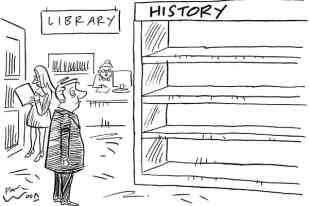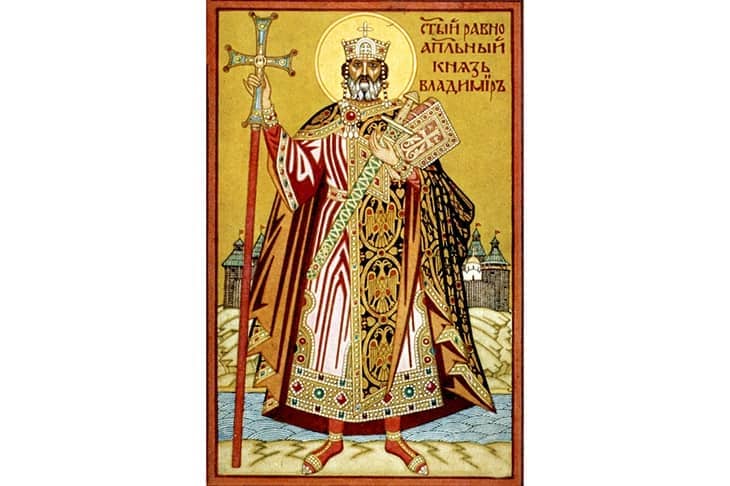It seems strange now that any of us ever imagined that Putin might not invade. He thinks of Ukraine as rightfully Russia’s, heart, mind and soul. It’s there in that essay he wrote last year: Russians and Ukrainians are ‘one people’, he said, meaning not that they’re brothers so much as that Ukrainians have no right to a separate identity. And I wonder whether, in attempting to take Kiev, he isn’t also trying to lay final claim to the founding myth that Russia and Ukraine fight over and both think of as their own.
Kiev is the setting for the epic tale of Kievan Rus, the first great Slavic state founded in the 900s by enterprising Viking Swedes. Putin clearly identifies with its warlord saint, Vladimir the Great. In 2016 he unveiled an enormous statue of that earlier Vlad, 100 yards from the Kremlin walls. Kiev has a statue too, but the Moscow Vlad is almost four times the size and his cloak billows ominously around him as if he’s on the move.
In 988, Vladimir the Great converted his people to Christianity, encouraging them into the Dnieper to be baptised in a very Putinesque way: ‘Come, lest you risk becoming the prince’s enemies…’ For Putin, this mass baptism was the moment that the Russian Orthodox Church was born. ‘St Vladimir laid the moral foundation on which our lives are still based today,’ he says.

This is very much not how Ukrainians see things. For them, the founding of Kievan Rus is their own story, not Russia’s. Russia didn’t exist back then, says the former Ukrainian president Petro Poroshenko, and anyway, St Vladimir ‘made a European choice’ in opting for Christianity. So alongside the grinding ground war drifts this long-running memory war. Does Putin see his invasion as a crusade? Well, he can spin it as a crusade to his more credulous countrymen, which amounts to the same thing.
The main source for the story of the Kievan Rus and the life of St Vladimir is a text called the Russian Primary Chronicle, or the Tale of Bygone Years, written in about the 11th century by the monks of Kiev’s cave monastery, the Pechersk Lavra. I read the Tale of Bygone Years over the weekend (in translation, obviously) and if St Vladimir is Putin’s moral lodestar, that’s revealing.
According to Nestor the Chronicler, under Prince Vladimir, the valleys of Kievan Rus flowed ceaselessly with blood. There’s page after page of the Rus pushing enemies into ditches – and an endless piercing with pikes of a tribe called the Pechenegs. One young protégé of St Vladimir demonstrates his strength by ripping the skin and flesh from a charging bull with one hand. Olga, Vladimir’s grandmother and a saint in her own right, defeats an enemy tribe by setting fire to a flock of birds, who then flap up to the rafters of their houses and burn them down.
For the Ukrainians, the founding of Kievan Rus is their story, not Russia’s
Putin might identify with Vladimir, but it’s Vlad’s dad, a pagan by the name of Sviatoslav, who I think he takes after most. Sviatoslav was the archetypal hard-man poser. He shaved his head, wore spotless whites and made a manly show of barbecuing his own strips of horseflesh for dinner. The Chronicler is dismissive about his demise: ‘The nomads took his head and made a cup out of his skull, overlapping it with gold, they drank from it.’ There’s a thought for the Azov brigade.
To be fair to Putin though, there is some continuity between the Russian Orthodox clergy and their ancient counterparts. If I’m reading the Chronicle right, it was St Vladimir’s bishops who encouraged him, after a spate of decent saintly behaviour, to give up on naive notions like mercy. ‘The number of bandits increased, and the bishops, calling to his attention the multiplication of robbers, inquired why he [Vlad] did not punish them.’ On Sunday last week – Forgiveness Sunday – Patriarch Kirill of the Russian Orthodox church, always in lockstep with Putin, gave his blessing to the war in Ukraine.
But the Tale of Bygone Years isn’t just a bloody battle saga written by onlooker monks. There’s another story running through it too. This story begins with the founding of Kiev by St Andrew, brother of Peter, who travelled up the Dnieper and then paused for a little prophecy on the spot where Kiev was later built. ‘See ye these hills? So shall the favour of God shine upon them, that on this spot a great city shall arise.’
But it was in the hill, not on it, that God really went to work. St Anthony of Kiev was a local who travelled to Mount Athos for religious instruction but then returned to Kiev and set up in a tiny underground cave to fast and pray. The Chronicles have less to say about Anthony than they do about Vladimir, because he spent his time in prayer, not colourfully slaughtering Pechenegs, but throughout his life and for centuries after his death other monks followed Anthony’s example and carved out their own cells in the rock, and their bodies still lie there, eerily preserved, in the tunnels under Kiev.
I went to visit them in 2005 on a holiday to Ukraine, bravely joining the queue of pilgrims and shuffling underground, though the tunnels are only one-person wide and there’s no possibility of turning and bolting back. I remember the saints’ bodies, elegantly dressed, lying in glass coffins, often with one leathery hand exposed to prove that their virtuous flesh had resisted decay. Theodosius, Alipy of the Caves, Ilya Muromets the bogatyr, Nestor the Primary Chronicler himself. I remember the smell of candles, the lip-prints on the glass coffin lids, and how surprised I was, having felt so unbearably claustrophobic, at not wanting to leave.
Does Putin really believe in God? For all he wears a cross, it’s hard to imagine that his faith is more than tactical spiritual nationalism. But he’ll know that Sunday 20 March, in just over a week, is the day when the saints of the Pechersk Lavra are especially venerated. And he’ll know that although St Vladimir’s surviving bones are kept in Moscow, it’s said that St Andrew’s body is still somewhere under Kiev, as yet undiscovered.







Comments